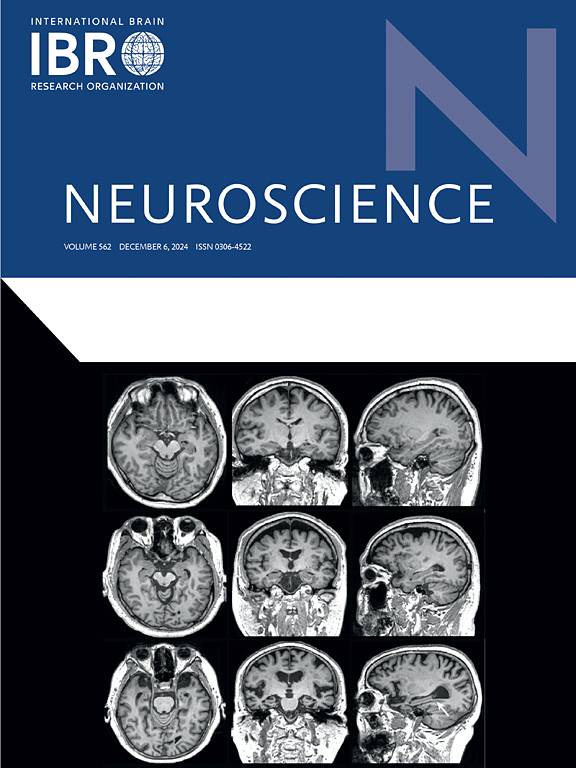单细胞RNA测序揭示开心散通过调节大鼠下丘脑神经可塑性和炎症对抑郁症的改善作用。
IF 2.8
3区 医学
Q2 NEUROSCIENCES
引用次数: 0
摘要
开心散(KXS)作为治疗抑郁症的传统中药方剂被广泛使用,但其对下丘脑微环境的调控机制尚不清楚。本研究通过单细胞RNA测序(scRNA-seq)结合行为和分子生物学实验,系统阐明KXS缓解慢性不可预知轻度应激(CUMS)诱导的大鼠抑郁的分子机制。行为测试显示,KXS显著改善了cms诱导大鼠的抑郁样行为。对对照大鼠、cms诱导大鼠、KXS处理大鼠和氟西汀处理大鼠分离的45482个下丘脑细胞进行scRNA-seq分析,发现9种主要细胞类型。这些细胞的转录图谱显示,CUMS减少了星形胶质细胞和脂肪细胞的数量,同时增加了促炎小胶质细胞和内皮细胞的数量。KXS干预恢复星形胶质细胞亚群(Astro_1),上调线粒体代谢相关酶CPT1A蛋白表达,降低M1/M2小胶质极化比,抑制促炎细胞因子TNF-α和CXCL10蛋白表达,升高抗炎细胞TGF-β蛋白表达。KXS重塑下丘脑细胞间通讯网络,增强星形细胞-神经元相互作用。KXS组下丘脑神经元核抗原、微管相关蛋白2、突触蛋白、突触后密度-95蛋白表达均显著升高,反映了神经元数量的变化和突触可塑性的改变。我们的研究首次证明KXS可以通过下丘脑scRNA-seq抑制主动性,恢复星形细胞线粒体代谢,重塑神经-星形细胞相互作用网络,增强突触可塑性,从而缓解抑郁症。这些结果为下丘脑微环境靶向抗抑郁药物的开发提供了理论基础。本文章由计算机程序翻译,如有差异,请以英文原文为准。
Single-cell RNA sequencing reveals the ameliorative effects of Kai-Xin-San on depression via regulating neuroplasticity and inflammation in the hypothalamus of rats
Kai-Xin-San (KXS) is widely used as a traditional Chinese herbal formula for treating depression, while its regulatory mechanisms on the hypothalamic microenvironment remain unclear. This study systematically elucidated the molecular mechanisms by which KXS alleviates chronic unpredictable mild stress (CUMS)-induced depression in rats through single-cell RNA sequencing (scRNA-seq) combined with behavioral and molecular biology experiments. Behavioral tests revealed that KXS significantly ameliorated depressive-like behaviors in CUMS-induced rats. The scRNA-seq analysis of 45,482 hypothalamic cells isolated from control rats, CUMS-induced rats, KXS-treated rats and fluoxetine-treated rats revealed nine major cell types. The transcriptional atlas of these cells revealed that CUMS reduced the numbers of astrocytes and adipocytes, while increasing the number of proinflammatory microglia and endothelial cells. KXS intervention restored astrocyte subpopulations (Astro_1), upregulated the protein expression of mitochondrial metabolism-related enzyme CPT1A, reduced the M1/M2 microglial polarization ratio, suppressed the protein expression of proinflammatory cytokines TNF-α and CXCL10, and elevated the protein expression of anti-inflammatory TGF-β. KXS remodeled hypothalamic intercellular communication networks, enhancing astrocyte-neuron interactions. The protein expression of neuronal nuclear antigen, microtubule-associated protein 2, synapsin, and postsynaptic density-95 in hypothalamus was significantly increased in KXS group, which reflected changes in the number of neurons and altered synaptic plasticity. Our study is the first to demonstrate that KXS can alleviate depression through the inhibition of proactivity, restoration of astrocytic mitochondrial metabolism, and reshaping of neuro-astrocyte interaction networks to enhance synaptic plasticity through scRNA-seq in hypothalamus. These results provide a theoretical foundation for the development of hypothalamic microenvironment-targeted antidepressant strategies.
求助全文
通过发布文献求助,成功后即可免费获取论文全文。
去求助
来源期刊

Neuroscience
医学-神经科学
CiteScore
6.20
自引率
0.00%
发文量
394
审稿时长
52 days
期刊介绍:
Neuroscience publishes papers describing the results of original research on any aspect of the scientific study of the nervous system. Any paper, however short, will be considered for publication provided that it reports significant, new and carefully confirmed findings with full experimental details.
 求助内容:
求助内容: 应助结果提醒方式:
应助结果提醒方式:


